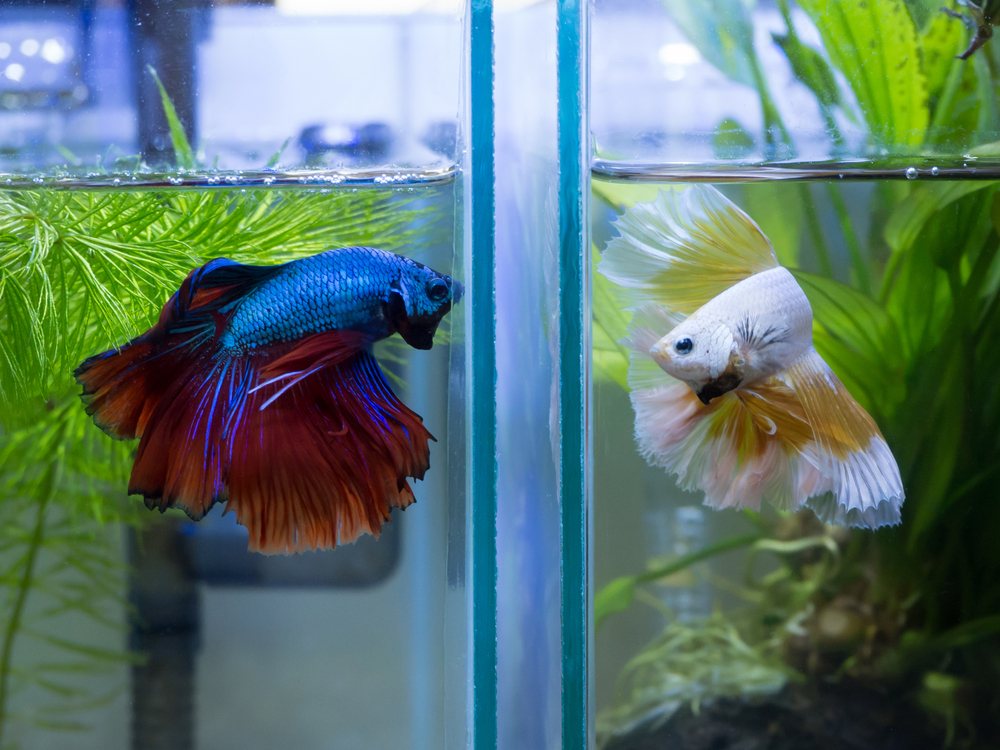Have you ever noticed your betta fish seeming less active or sluggish? You may be worried when you see your once-vibrant fish appearing more still. Some people think it is because of hibernation, but betta fish do not hibernate in the traditional sense that some animals do.
Many animals, like bats, squirrels, turtles, and crocodiles, use hibernation to survive cold winters. On the other hand, bettas, as tropical fish, actually need consistently warm water to thrive.
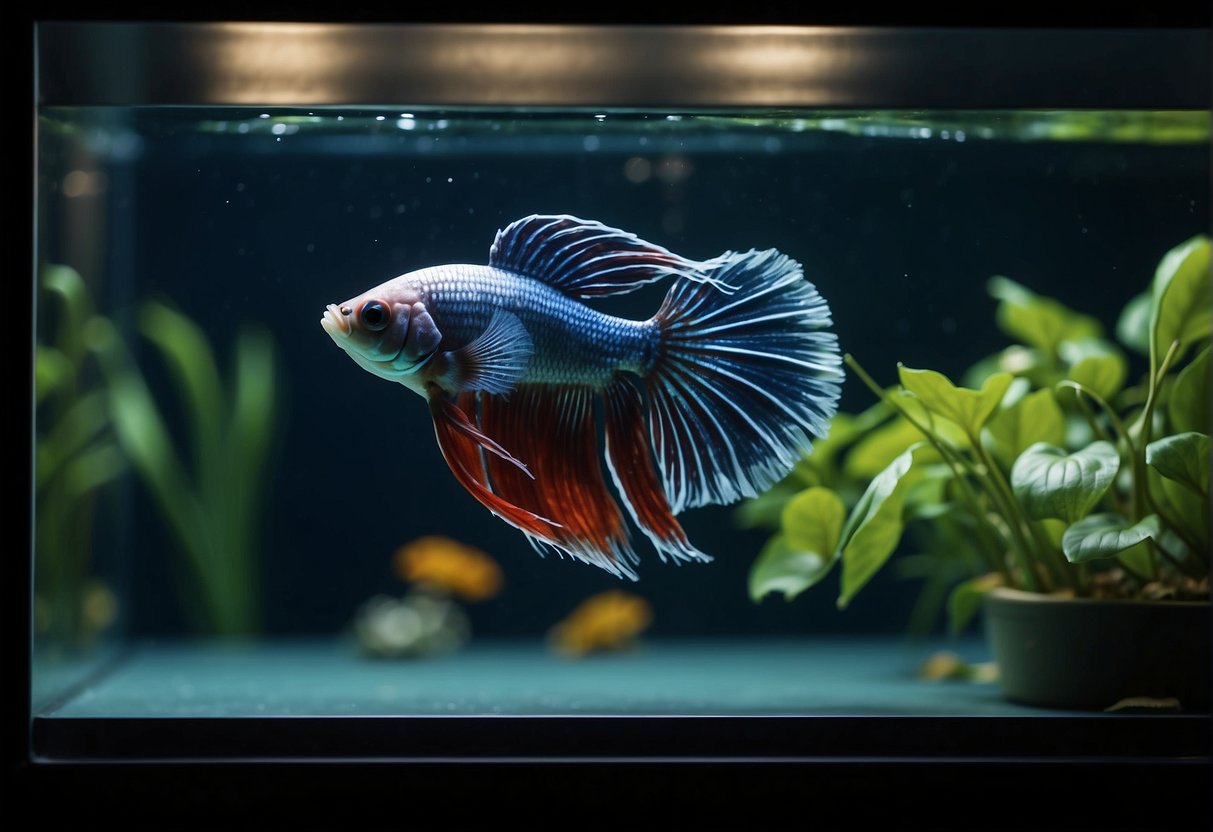
Understanding your betta’s behavior is key to providing the best care, including knowing what to look for when they seem unusually inactive. Bettas have a natural sleep cycle; you might find them hovering near the bottom of the tank or resting among the plants while sleeping.
Your betta fish can even change color when sleeping, so don’t be alarmed if they look slightly different. In today’s post, we will expound on this myth, discussing the nuances involved in hibernation and how that correlates with betta fish behavior.
Contents
Do Betta Fish Hibernate?
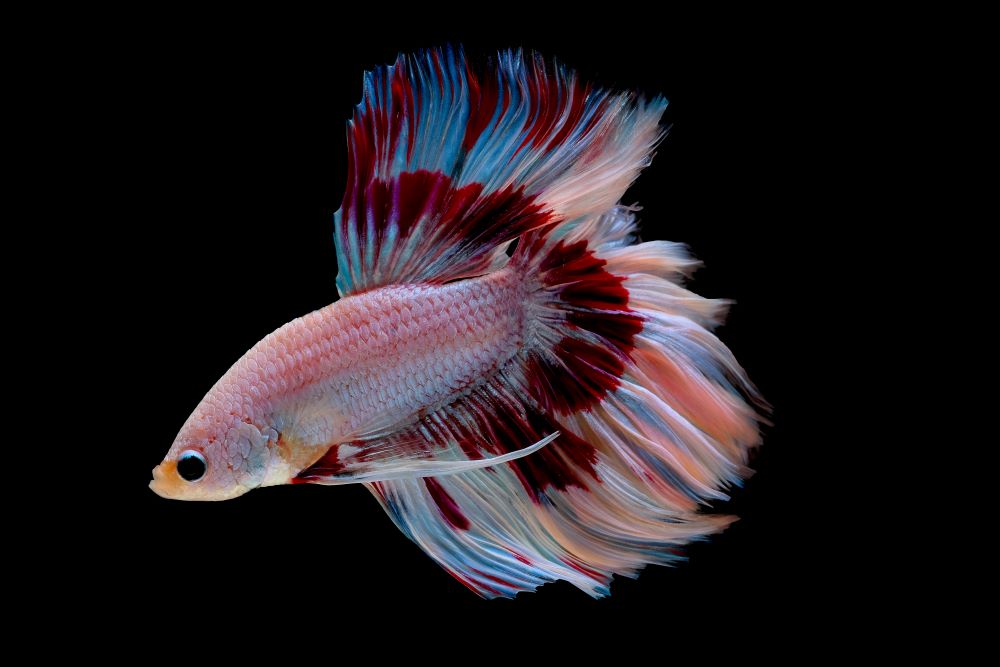
To better understand the basis and debunk the myth surrounding betta fish hibernation, you need to examine their biological and behavioral processes closely and how these aspects may relate to hibernation.
Defining Hibernation
Hibernation is a natural process characterized by a period of inactivity and a reduced metabolic rate, which allows animals to conserve energy during extreme weather conditions or when food resources are minimal.
During hibernation, an animal’s body temperature drops significantly as it enters a state of torpor, a temporary reduction in physical and metabolic activity. This condition is generally observed in many mammals, reptiles, and amphibians as an adaptation to survive winter or other unfavorable conditions.
Common Misconceptions
Many people believe that betta fish hibernate like other animals. This is a misconception. Betta fish are tropical creatures and, thus, do not hibernate in the traditional sense. Instead, they might experience a reduced level of activity if the water temperature drops significantly, which is not true hibernation but can be confused with it.
Cold water can induce a state that mimics torpor, though, unlike hibernation, this state is not a part of the fish’s natural cycle and is often a sign of stress or an environment that is not ideal for the fish’s health. You must be careful about the temperature of your betta fish’s water.
If it changes too quickly, your betta could get shocked and become slow and inactive. Keeping the water at the right temperature is vital so your betta stays healthy and happy.
You will also like these other related posts:
- Betta Fish Laying on Bottom of Tank
- Can Betta Fish Survive in Tap Water?
- How Much to Feed Betta Fish for Optimal Health and Longevity
Betta Fish Biology and Behavior
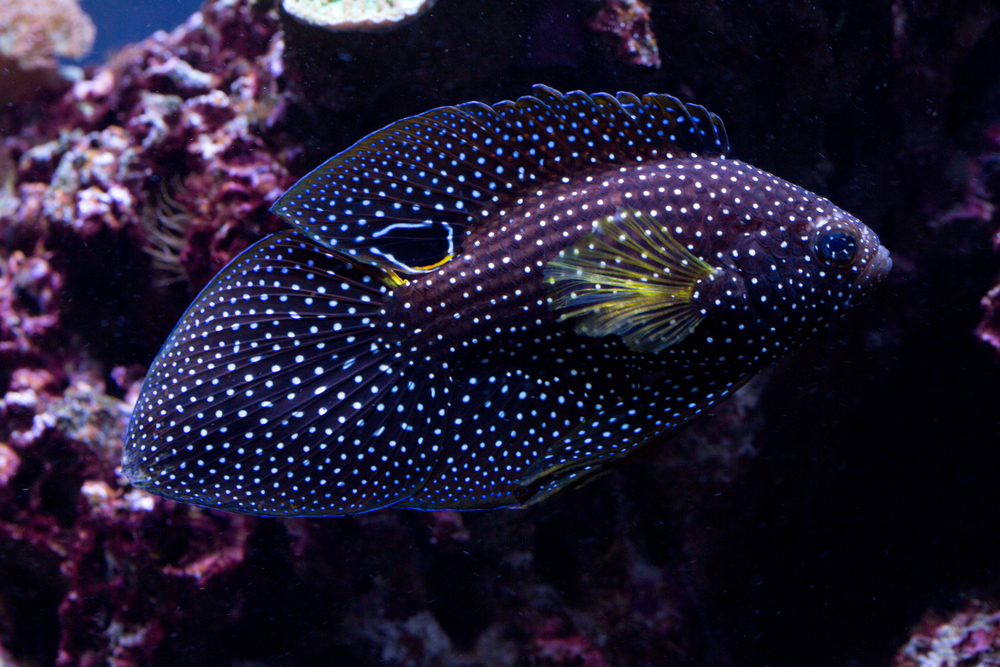
There are two key aspects to analyzing betta fish biology and behavior: Betta fish origin and daily activity patterns. Both aspects impact how bettas manage their energy reserves and rest cycles.
Natural Habitat
Research indicates that betta fish are a tropical fish species that are native to the warm waters of Southeast Asia. Specifically, they thrive in areas with steady, warm temperatures ranging from 76° to 82° Fahrenheit. This environmental consistency is critical for their well-being, influencing their metabolism and health.
Activity Patterns
Betta fish are generally active throughout the day and rest at night at the tank’s bottom or perched on plant leaves. However, unlike many other species that may remain dormant for set periods or go into hibernation, betta fish maintain a level of activity year-round.
They do experience reduced activity levels at times, often misinterpreted as hibernation, which can signal stress due to water conditions that aren’t ideal for them.
Optimal Tank Conditions
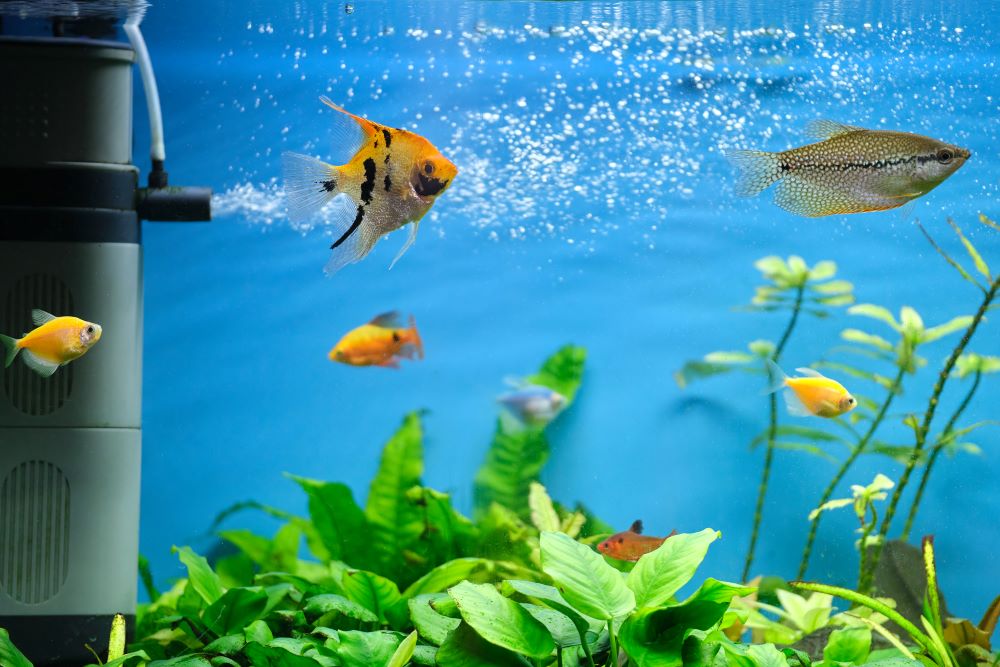
Proper care of your betta fish tank keeps them happy and healthy. You need to ensure the water is constantly at the right temperature and clean and that the tank has cool decorations and hiding spots. This way, your betta fish will love their home.
Temperature Regulation
Use a reliable heater to keep the water temperature between 78° and 80° Fahrenheit (25.5° and 26.5° Celsius). This tropical range is vital since betta fish do not hibernate and require consistent warm temperatures. A thermometer must also monitor the temperature regularly and adjust when needed.
Water Quality
Keeping your betta fish tank clean is vital for the performance of your bettas. To do this, you need to test the water often. The best water for your betta fish is as follows:
- The water is not too acidic (around 6.5 to 7.5 pH)
- It has no ammonia or nitrite
- The water has a little bit of nitrate (less than 20 ppm)
You can use a water conditioner to make tap water safe for your betta fish. Following these tips will give your betta fish a happy and healthy home.
Aquarium Setup
Your betta fish needs an excellent place to live. Here are some tips to help you set up a comfortable home for your betta fish.
- Plants and decorations: Add hiding spots for your betta fish, such as plants and caves. This will make your betta feel safe and less stressed.
- Tank mates: Add small creatures like shrimp to live with your bettas. However, be careful when adding new tank mates. Bettas can be weird sometimes.
- Enough space: Your betta fish needs room to zoom around. So, set up a tank of at least 5 gallons so they can roam and swim happily.
Betta Fish Sleep Patterns
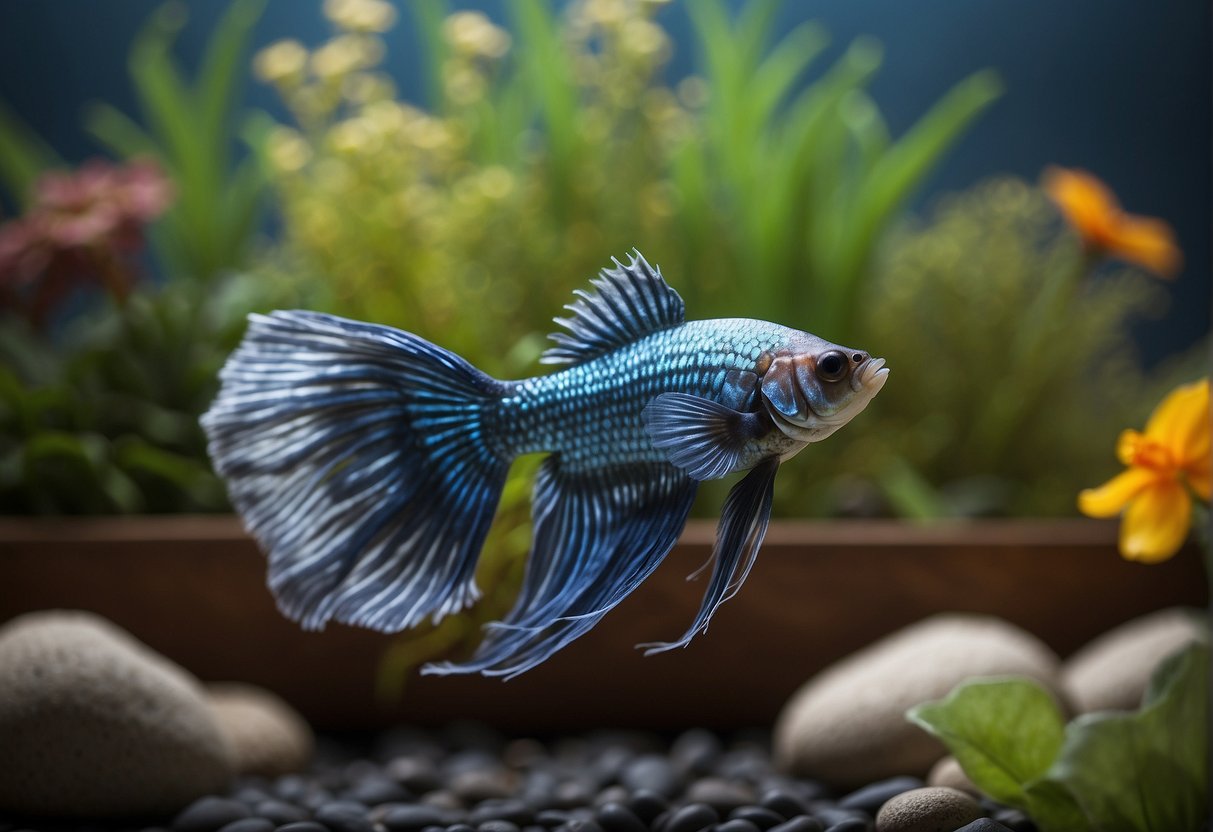
Understanding the sleep patterns of betta fish is important to provide them with a healthy and balanced environment. These tropical fish have distinct sleeping behaviors and are influenced by light and darkness.
Sleeping Behaviors
Betta fish do not have eyelids, so it might not be apparent when they are asleep. However, sleep is vital for their entire health. If a betta fish appears lethargic during the day or sleeps too much, it could be a sign of a problem. On the other hand, short periods of rest, or napping, during the day are typical for bettas.
Adjusting Light and Darkness
To support betta fish’s healthy sleep schedule, you must mimic their natural light cycles as closely as possible. Betta fish are diurnal, meaning they are active during the day and rest at night.
In that case, keeping the light on for about 12 hours daily and providing darkness for the remaining 12 hours encourages a consistent sleep pattern. Lighting should be gradual to simulate sunrise and sunset, which helps prevent stress.
Betta Fish Monitoring and Care
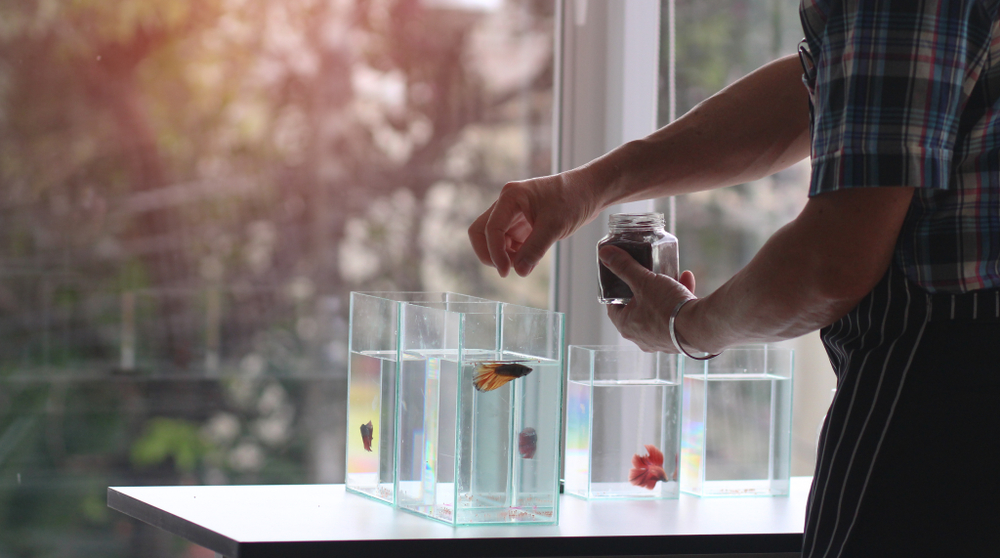
Careful and consistent monitoring is vital when maintaining your betta fish’s habitat. This helps your fish remain healthy, active, and free from signs of disease or stress.
Regular Observation
Make it a habit to observe your betta daily. Watching for irregularities in their breathing or gill movement provides early indicators of potential health issues.
Note changes in activity levels; a betta hiding more than usual might signal stress or sickness. To prevent boredom and promote exercise, make sure there are ample hiding places that also serve as spaces for exploration.
Veterinary Care
If you notice any troubling signs, such as swollen gills, faded colors, or lethargy, don’t hesitate to consult a specialized veterinarian in aquatic animals. Early detection and treatment of any disease are vital for the well-being of your betta fish.
Caring for Betta Fish in Different Seasons
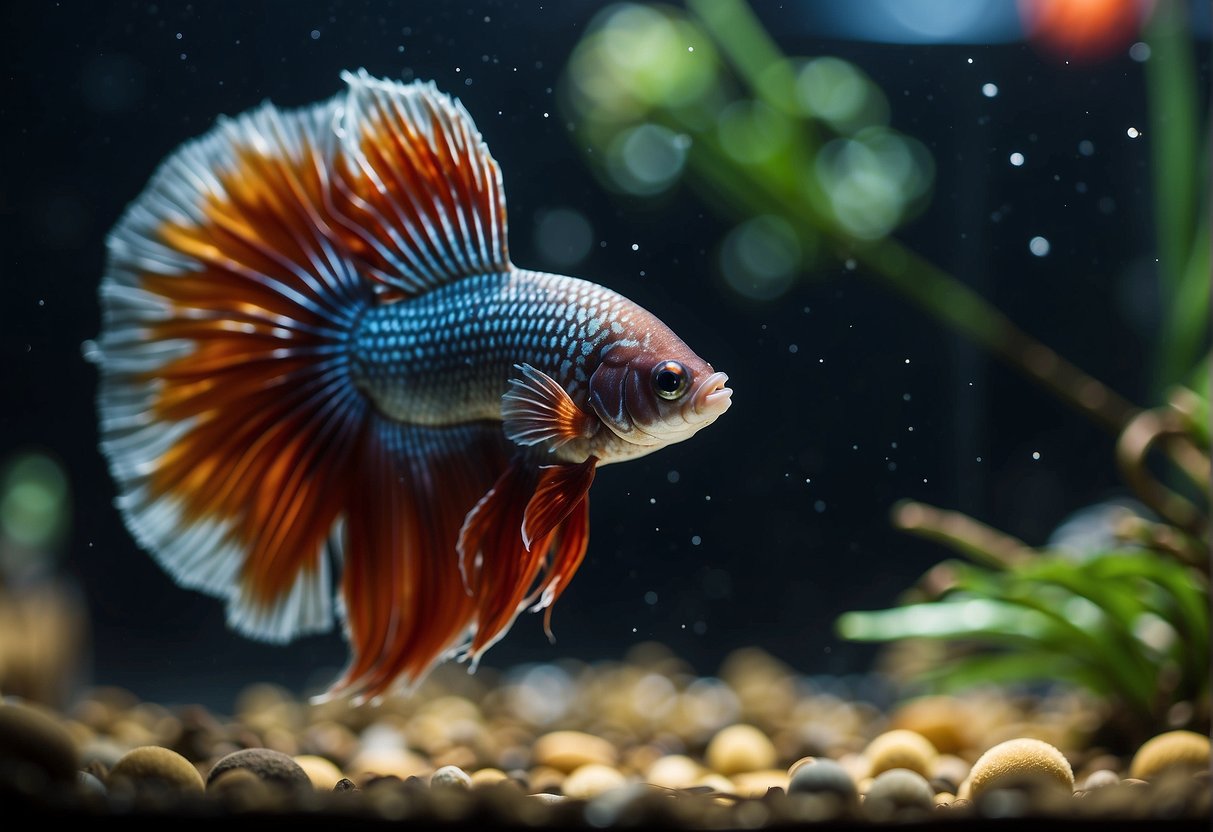
When the seasons change, so do the needs of betta fish. Therefore, you want to maintain their health and comfort by adjusting their care, particularly in winter, as winter temperatures drop below their optimal temperature range.
Winter Care
During winter, temperature drops can be risky for betta fish. To prevent temperature shock, consistently monitor the aquarium’s heater to maintain a stable environment between 78° to 80° Fahrenheit.
If you notice your betta fish becoming lethargic, it could indicate the water being too cold, which may cause them to conserve energy, a state often mistaken for hibernation. In terms of feed, betta fish may eat less in winter. Reduce their feeding schedule to prevent overfeeding and maintain optimal water quality.
Year-Round Maintenance
Throughout the year, keep a close eye on the temperature and water conditions fluctuations to avert temperature shock. A consistent schedule for feeding, tank cleaning, and water parameter testing are all integral to maintaining betta fish health. Adjust as needed based on their activity and appetite, which varies with seasonal changes and their lifecycle.
Conclusion
Betta fish might seem less active sometimes, but don’t worry—they’re not hibernating like bears or squirrels! Hibernation means deep sleep to survive the winter, though betta fish are tropical. They need warm water all year round to stay healthy. If your betta seems slow or hides a lot, checking a few things is essential.
First, make sure the water temperature is right. It should feel like a warm bath, not too cold. Your fish may feel stressed or under the weather if the water’s okay. Like us, bettas sometimes need extra rest when they don’t feel well. Remember, bettas need to sleep just like we do. They might rest near the bottom of the tank at night or among plants.
However, they won’t disappear for the whole winter. Keeping their tank warm and clean and giving them good food will help your betta fish stay happy, healthy, and active.
Frequently Asked Questions
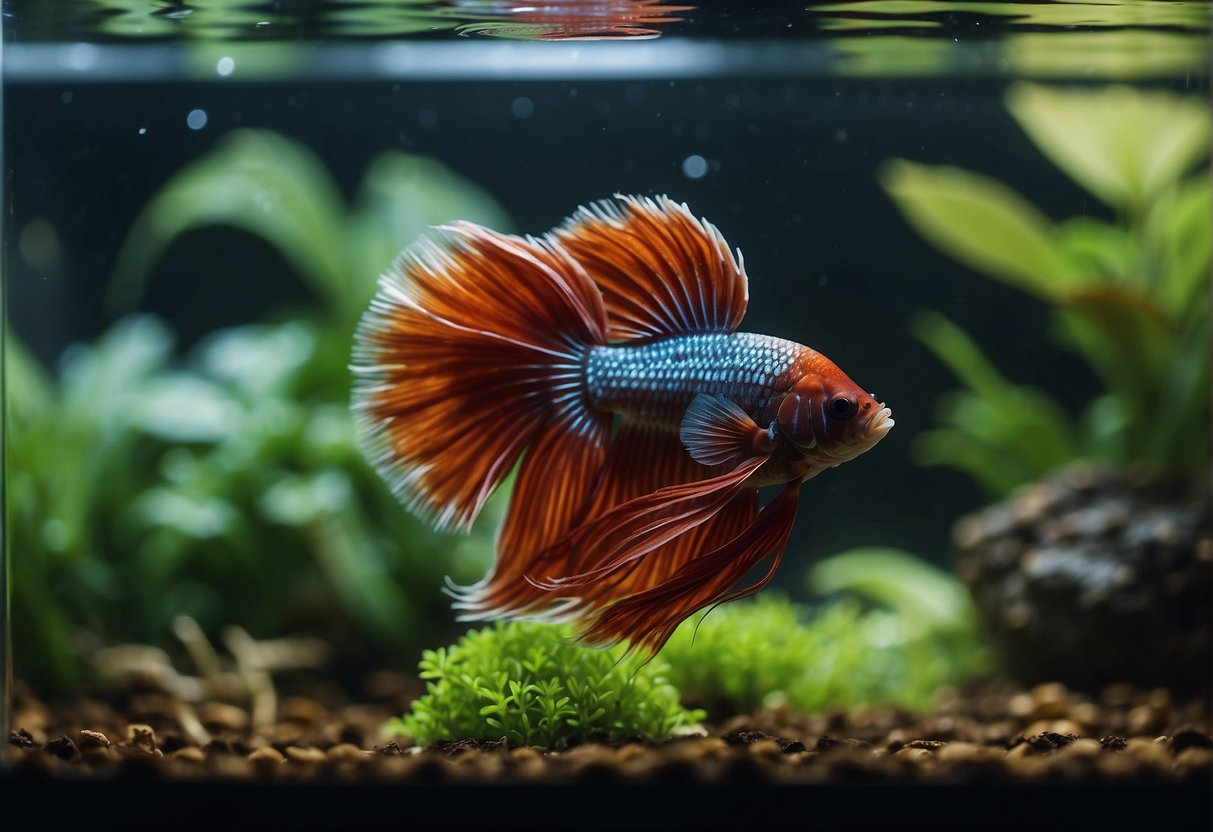
Here are some of the more common betta fish hibernation-related questions.
Why is my betta fish not moving?
If your betta fish is not moving, it might feel sick or stressed. Some common reasons that stop your betta fish from moving might include poor water quality, low oxygen levels, and high ammonia levels. Test the water and keep the temperature and pH level right for your bettas.
How do I know that my betta fish is sleeping and not dead?
It can be tricky to tell if your betta fish is sleeping or has passed away. However, there are some differences. When your betta fish sleeps, it usually has a loose, relaxed body and breathes slowly and steadily. It might also hide or rest at the bottom of the tank. If it has died, it will not move at all, and its body might start to decompose.
Can I help my betta fish become more active?
To help your betta fish become more active, add toys or decorations to the tank to hide places and encourage their natural behaviors. You can also try feeding them live or frozen foods like brine shrimp or bloodworms, which can be more fun for them to chase and eat.
What conditions lead betta fish to enter a hibernation-like state?
Drastic temperature changes, particularly during winter months, can trick a betta fish’s body into a dormant state. Ideally, bettas require stable temperatures between 78°F and 80°F (25.5°C to 26.5°C). It’s crucial to maintain the appropriate water temperature to avoid these changes in activity and prevent stress.
Are there any signs to differentiate between normal rest and a dormant state in betta fish?
A key difference is responsiveness; during rest, bettas are still alert to their environment, whereas in a dormant state induced by temperature shocks, they may appear limp and unresponsive and should be warmed gradually and carefully.

Ian Sterling, founder of Fishlab.com, began his aquarium journey over 30 years ago, driven by a deep fascination for fish and their diverse personalities. His website, Fishlab.com, is dedicated to making fishkeeping accessible and enjoyable, offering beginner-friendly guidance, expert insights, and a community for aquarists to connect and share experiences.


